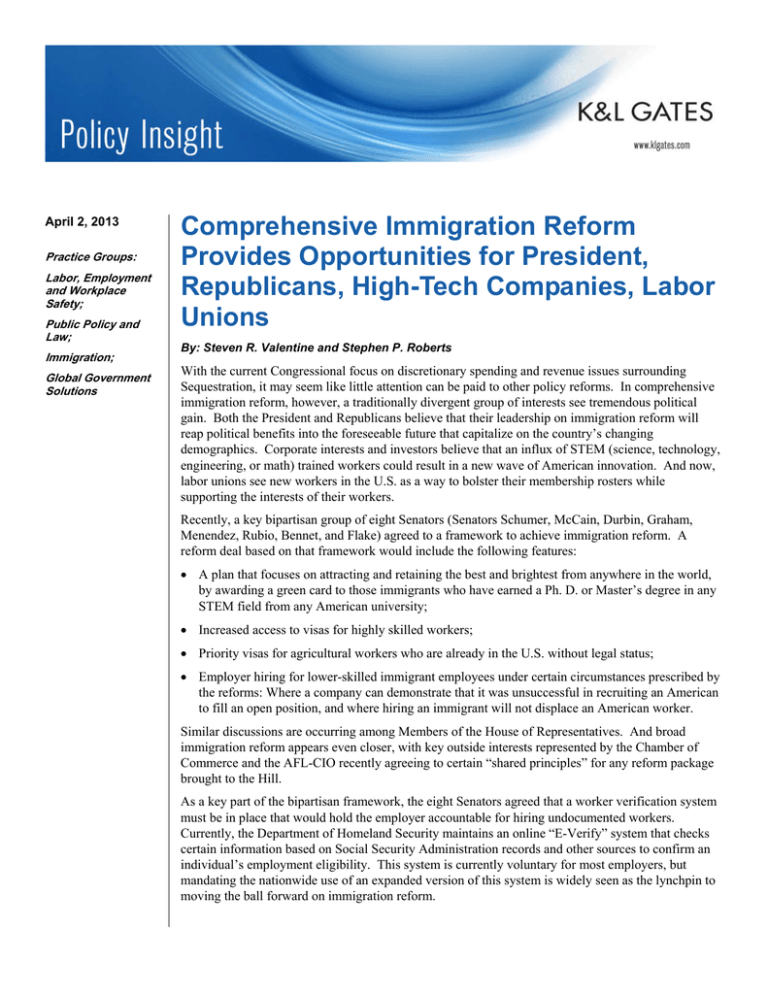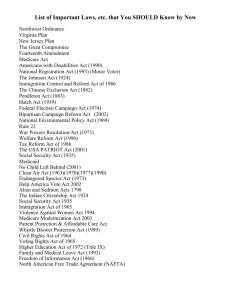
April 2, 2013
Practice Groups:
Labor, Employment
and Workplace
Safety;
Public Policy and
Law;
Immigration;
Global Government
Solutions
Comprehensive Immigration Reform
Provides Opportunities for President,
Republicans, High-Tech Companies, Labor
Unions
By: Steven R. Valentine and Stephen P. Roberts
With the current Congressional focus on discretionary spending and revenue issues surrounding
Sequestration, it may seem like little attention can be paid to other policy reforms. In comprehensive
immigration reform, however, a traditionally divergent group of interests see tremendous political
gain. Both the President and Republicans believe that their leadership on immigration reform will
reap political benefits into the foreseeable future that capitalize on the country’s changing
demographics. Corporate interests and investors believe that an influx of STEM (science, technology,
engineering, or math) trained workers could result in a new wave of American innovation. And now,
labor unions see new workers in the U.S. as a way to bolster their membership rosters while
supporting the interests of their workers.
Recently, a key bipartisan group of eight Senators (Senators Schumer, McCain, Durbin, Graham,
Menendez, Rubio, Bennet, and Flake) agreed to a framework to achieve immigration reform. A
reform deal based on that framework would include the following features:
A plan that focuses on attracting and retaining the best and brightest from anywhere in the world,
by awarding a green card to those immigrants who have earned a Ph. D. or Master’s degree in any
STEM field from any American university;
Increased access to visas for highly skilled workers;
Priority visas for agricultural workers who are already in the U.S. without legal status;
Employer hiring for lower-skilled immigrant employees under certain circumstances prescribed by
the reforms: Where a company can demonstrate that it was unsuccessful in recruiting an American
to fill an open position, and where hiring an immigrant will not displace an American worker.
Similar discussions are occurring among Members of the House of Representatives. And broad
immigration reform appears even closer, with key outside interests represented by the Chamber of
Commerce and the AFL-CIO recently agreeing to certain “shared principles” for any reform package
brought to the Hill.
As a key part of the bipartisan framework, the eight Senators agreed that a worker verification system
must be in place that would hold the employer accountable for hiring undocumented workers.
Currently, the Department of Homeland Security maintains an online “E-Verify” system that checks
certain information based on Social Security Administration records and other sources to confirm an
individual’s employment eligibility. This system is currently voluntary for most employers, but
mandating the nationwide use of an expanded version of this system is widely seen as the lynchpin to
moving the ball forward on immigration reform.
Comprehensive Immigration Reform Provides
Opportunities for President, Republicans, High-Tech
Companies, Labor Unions
The Senators also want some kind of system to be in place that would make it more difficult for
workers to falsify documents. This might ultimately occur by replacing traditional citizenship
documents with some sort of “Safe ID” card (compliant with the Real ID Act of 2005), or an enhanced
Social Security card. Significant policy disagreements emerged, however, during the original
consideration of the Real ID Act regarding whether that law would create a “national ID” system.
Those debates could be rekindled as immigration reform legislation takes shape.
Some points of disagreement remain. For instance, while many House and Senate members believe
that the resources of American talent in STEM-trained areas are thin, others claim that increasing
foreign visas would have the effect of flooding the talent pool with cheap, foreign labor in highly
skilled industries.
If Congress fails to reach a bipartisan agreement, many of these same reforms may result through a
series of executive actions. Since early 2011, President Obama has endorsed a plan with specific
methods of reforming the immigration system. In the middle of 2012, the President took executive
action to prohibit deporting many people who were brought to the country as minors under 16 years
old. Since then, the Administration has also announced a series of policy changes that ease
deportation rules for those already in the U.S. If Congress is unsuccessful in its efforts to reach a
reform deal in the coming months, the President may choose to make additional reforms to
immigration enforcement policies.
Authors:
Steven R. Valentine
rick.valentine@klgates.com
+1.202.661.3802
Stephen P. Roberts
steve.roberts@klgates.com
+1.202.778.9357
2
Comprehensive Immigration Reform Provides
Opportunities for President, Republicans, High-Tech
Companies, Labor Unions
Anchorage Austin Beijing Berlin Boston Brisbane Brussels Charleston Charlotte Chicago Dallas Doha Dubai Fort Worth Frankfurt
Harrisburg Hong Kong Houston London Los Angeles Melbourne Miami Milan Moscow Newark New York Orange County Palo Alto Paris
Perth Pittsburgh Portland Raleigh Research Triangle Park San Diego San Francisco São Paulo Seattle Seoul Shanghai Singapore Spokane
Sydney Taipei Tokyo Warsaw Washington, D.C. Wilmington
K&L Gates practices out of 48 fully integrated offices located in the United States, Asia, Australia, Europe, the
Middle East and South America and represents leading global corporations, growth and middle-market companies,
capital markets participants and entrepreneurs in every major industry group as well as public sector entities,
educational institutions, philanthropic organizations and individuals. For more information about K&L Gates or its
locations, practices and registrations, visit www.klgates.com.
This publication is for informational purposes and does not contain or convey legal advice. The information herein should not be used or relied upon in
regard to any particular facts or circumstances without first consulting a lawyer.
©2013 K&L Gates LLP. All Rights Reserved.
3





